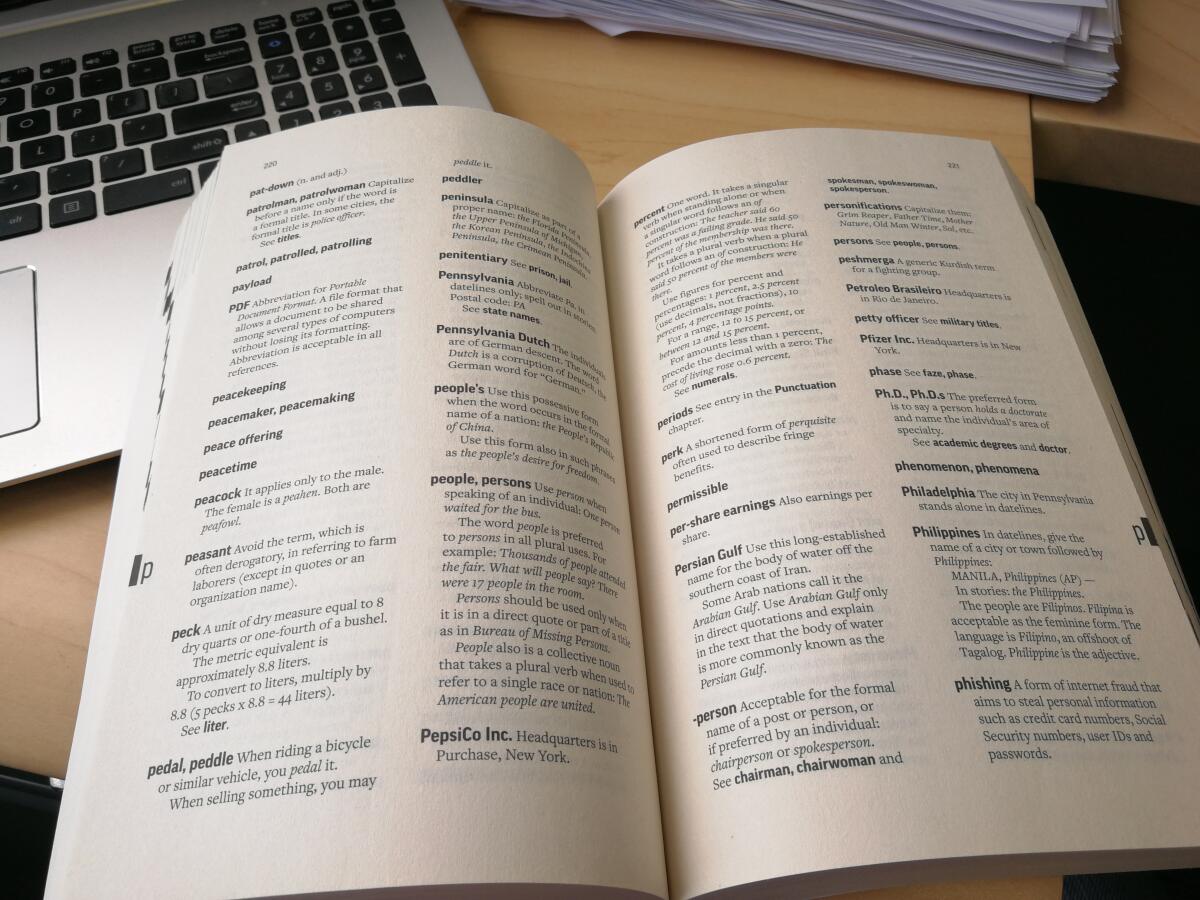A Word, Please: Style books shed use of hyphens, commas we’ve gotten used to

You may not have noticed, but your world just got less hyphenated. There are fewer commas, too.
That’s because changes to the country’s two most influential style books lean lighter on those punctuation marks, but only in certain, very specific circumstances.
Here are some of the new punctuation rules influencing what you read and, if you like, what you write too.
Hyphen not needed for “pre” or “re” before an e. Hyphenation rules break down into different categories. For nouns, like “passer-by” and verbs like “mass-produce,” you can just go with whatever your dictionary says. For compound adjectives you make up yourself, like a “hyphen-obsessed editor,” the longstanding rule has been to add your own hyphen if it helps.
But for prefixes — well, heaven help you. The rules vary from prefix to prefix and even from situation to situation for the same prefix.
Case in point: For years, the Associated Press Stylebook advised followers: “except for ‘cooperate’ and ‘coordinate,’ use a hyphen if a prefix ends in a vowel and the word that follows begins with the same vowel.”
This came up most with the prefixes “pre” and “re”: pre-election, re-energize, and the like. No more.
“We removed the hyphen in double-e combinations,” the editors stated in the 2019 edition. So now it’s preelection and reenergize.
No hyphen in “passerby.” There’s no getting around it: passer-by has always been a weird word with the very weird quality of forming its plural with an internal s: passers-by.
For years now, different styles and dictionaries have disagreed on whether the hyphen is necessary. But AP just joined many others by dropping the hyphen. It’s now “passerby” in both AP and Chicago styles, with the now-even-weirder plural: passersby.
Hyphen in “decision-making” in Chicago style. It’s always been difficult to know whether terms with “maker” and “making” should be hyphenated. AP has a whole entry for “maker,” which says to check Webster’s New World College Dictionary for the specific term.
That dictionary has no entry for the hyphenated term “decision-maker,” meaning you can either leave it unhyphenated or follow AP’s general guidance that says to use hyphens when you think they help.
The Chicago Manual, on the other hand, has just leaned hard in the opposite direction by specifically calling for a hyphen in “decision-making.”
No comma after “etc.” Another change from the most recent edition of the Chicago Manual of Style. The abbreviation “etc.” used to be set off with two commas — one before and one after.
The after-comma is now gone. “The abbreviation ‘etc.’ … and such equivalents as ‘and so forth’ and ‘and the like’ are preceded by a comma,” the editors wrote in the latest edition.
“They are followed by a comma only if required by the surrounding text. This small departure from the recommendation in previous editions treats such terms as equivalent to the final element in a series.”
Consider the example: “The map was incomplete, lacking many of the streets, alleys, etc. of previous editions.” If you swapped out the “etc.” for specific nouns like “buildings and parks,” you wouldn’t follow that with a comma. So, as Chicago notes, there’s no reason “etc.” should be different.
No comma necessary before “too” or “either.” This new rule in the Chicago Manual weirds me out. When I was young, someone must have told me explicitly that “too” and “either” are always set off with commas.
For years, I thought this was a firm rule. I later learned it’s not. The comma isn’t mandatory in any style. But now, in Chicago style, these adverbs “generally need not be preceded by a comma.”
Chicago’s examples look strange to me: “I had my cake and ate it too.” “Anders likes Beethoven; his sister does too.” But no one asked my opinion, so I guess I’ll just try to keep up with the ever-changing rules.
